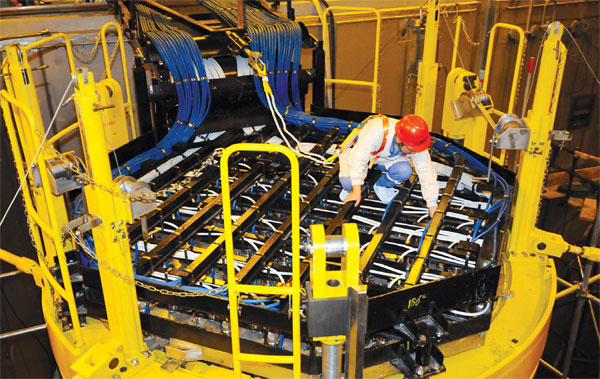Japan's huge stockpiles of plutonium pose risks
Updated: 2015-10-22 07:54
(China Daily)
|
||||||||
 |
|
A worker at Guangxi Fangchenggang Nuclear Power Plant, which uses Hualong One technology. [Photo provided to China Daily] |
China is justified in raising concerns over Japan's excessive accumulation of sensitive nuclear materials and its imbalance in the supply and demand of nuclear materials. And the international community has good reason to ask how the island country is going to use its huge stockpile of plutonium.
At a discussion on nuclear disarmament at the first committee of the 70th session of the UN General Assembly on Tuesday, China's Ambassador for Disarmament Affairs Fu Cong warned Japan's nuclear material stockpile gives rise to grave risks both in terms of nuclear security and nuclear proliferation.
"At present, Japan possesses about 1,200 kilograms of highly-enriched uranium and about 47.8 tons of separated plutonium, among which 10.8 tons are stored on Japanese territory, enough to make 1,350 nuclear warheads," said Fu.
Although every country in the world, Japan included, is entitled to peaceful use of nuclear energy, Japan's huge stockpiles of nuclear materials far exceed its nuclear energy development needs. And since Japan is the only non-nuclear-weapon state capable of reprocessing plutonium to make nuclear weapons, this may well explain why Japan's plutonium stockpile has also sounded alarm bells in the Western world.
An Associated Press report warned earlier this month that Japan plans to open a plant, as early as next spring, that could reprocess enough spent reactor fuel to make as many as 1,000 nuclear bombs a year.
In the past, high-ranking Japanese officials, the prime minister included, have openly admitted that Japan would be able to make an atomic bomb in three to six months. It is known to all that the Japanese rightists have never given up their dream of their country having nuclear weapons.
The current Japanese government's tougher stance on national security has only drawn more suspicions about Japan's rising stockpiles of plutonium and uranium. Given Japanese Prime Minister Shinzo Abe is leading Japan along an ultra-rightist road and constantly challenging the post-war international order, there is no guarantee that Japan will never use its massive plutonium stockpile for more dangerous purposes.
For nuclear safety and the security of itself and the region at large, Japan should respond to the concerns of the international community in a responsible manner and take concrete measures to address its problematic surplus of nuclear materials.

 Royal toast: Queen hosts state banquet for visiting Xi
Royal toast: Queen hosts state banquet for visiting Xi
 Xi and first lady visit British royal collections' Chinese items
Xi and first lady visit British royal collections' Chinese items
 Top 10 highlights in China-UK Year of Cultural Exchange
Top 10 highlights in China-UK Year of Cultural Exchange
 British int'l schools in China
British int'l schools in China
 Top 10 M&A deals between China and UK
Top 10 M&A deals between China and UK
 29 similarities both countries share
29 similarities both countries share
 Deals signed, agreements in pipeline
Deals signed, agreements in pipeline
 'Amazing China' on London's cabs
'Amazing China' on London's cabs
Most Viewed
Editor's Picks

|

|

|

|

|

|
Today's Top News
Tu first Chinese to win Nobel Prize in Medicine
Huntsman says Sino-US relationship needs common goals
Xi pledges $2 billion to help developing countries
Young people from US look forward to Xi's state visit: Survey
US to accept more refugees than planned
Li calls on State-owned firms to tap more global markets
Apple's iOS App Store suffers first major attack
Japan enacts new security laws to overturn postwar pacifism
US Weekly

|

|







